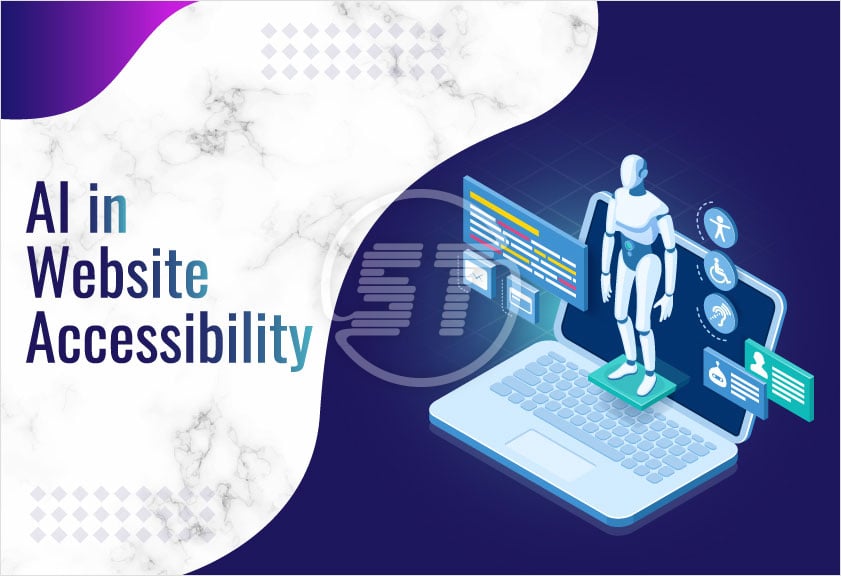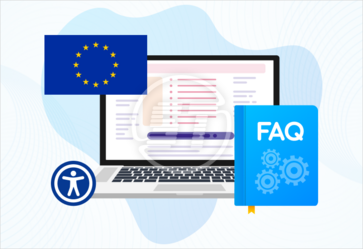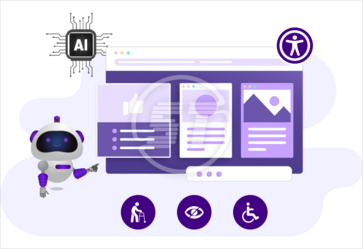In the digital age, where websites serve as gateways to information, services, products, and opportunities, ensuring accessibility for all users is paramount. However, traditional methods of website accessibility have often fallen short of accommodating the diverse needs of individuals, particularly those with disabilities. For instance, constant improvement is a basic requirement for a website’s performance, user experience, and accessibility. AI tools make this task easier by optimizing websites for modern users and offering them personalized user experience.
Here, the transformative potential of Artificial Intelligence (AI) emerges as a beacon of hope. AI offers innovative solutions to enhance website accessibility, promising a more inclusive online experience for all, including people with disabilities.
In this article, we will explore artificial intelligence accessibility, the ways to improve website accessibility using AI, and the profound impact of AI on website accessibility.
What is artificial intelligence in digital accessibility?
Digital Accessibility within artificial intelligence involves developing and deploying AI-driven technologies and apps to ensure usability and equal access for everyone, including people with disability. It involves the best suitable way to use AI-based digital accessibility solutions to enhance existing web accessibility frameworks and establish a more inclusive digital environment. This initiative enables individuals with disabilities to engage fully and reap the benefits of AI-driven solutions.
Website performance optimization and accessibility using AI-powered tools!
User experience personalization
Organizations can analyze user browsing patterns, previous interactions and create personalized user experiences using AI.
Artificial Intelligence scans each minute detail such as location and age of the user as well to tailor the digital experience. AI-powered predictive personalization method works on behavioral targeting wherein AI helps suggest products and articles suitable to user interests.
AI also learns from user actions and gets better regularly at offering personalized experiences. AI-driven personalization helps businesses to connect with users and increase engagement and sales.
User behavior analysis
AI helps track and analyze data such as clicks, scrolling, and time spent by individuals on each page. All these patterns are crucial insights into learning users' likes, dislikes, and their pain points to execute needed improvement.
Artificial Intelligence is a huge assistance in optimizing ecommerce websites by reaching out to potential customers and driving conversions by utilizing user behavioral data. Also, the machine learning model does predictive analysis for businesses and informs them about what users tend to search for in advance, which is a boon for ecommerce.
Improved way to include accessibility standards
AI is indeed a valuable technology in creating a user-friendly environment for everyone since it covers various facets of web accessibility. For instance, auto-generation of captions for images and videos, making the multimedia content accessible for visually or hearing-impaired users.
Additionally, AI helps to make useful navigation for users with disabilities by structuring the site’s layout and content. By providing descriptive headings, ensuring logical content order, proper labelling, and suggesting screen readers’ accessibility, it leaves no stone unturned of every important aspect of website accessibility.
Automated content creation
Even content creation strategies can be automated using AI tools. Such as creating image alter text, social media captions, product descriptions, etc. Generally, AI tools generate content by analyzing colossal database that aligns with given specifications. The content creation tools use natural language generation (NLG) technology, which processes data to generate human-like text.
Ecommerce has a significant usage of AI tools to create unique content for each product and catalog. Interestingly, the AI machine learning model is helping to improve content quality over time.
Chatbots for customer service
AI-powered chatbots are another revolutionizing facet of AI that is uplifting the customer service experience by offering quick and personalized assistance. They understand user queries and respond to them immediately. Chatbots also perform tasks like guiding users to navigate and process transactions. The most noticeable role of AI is its uninterrupted availability for users.e customer service experience by offering quick and personalized assistance. They understand user queries and respond to them immediately. Chatbots also perform tasks like guiding users to navigate and process transactions.
The most noticeable role of AI is its uninterrupted availability for users.
Website accessibility success stories with artificial intelligence
Numerous companies and organizations have adopted AI to improve website accessibility and foster a more inclusive online environment. Here, we'll explore a few inspiring success stories:
Microsoft:
Through its AI for Accessibility initiative, Microsoft develops AI-powered tools that support users with disabilities. With the Seeing AI app, visually impaired users can describe scenes, read text, and identify objects using artificial intelligence.
Google:
Users with hearing impairments can access real-time captioning across various apps using Google's AI-powered live caption feature. It automatically generates captions for any video and audio content. It also allows users to adjust the speed of the captions and to customize the font size.
Skynet Technologies:
To provide digital accessibility solutions for various disabilities including blind, motor impaired, color blind, dyslexia, visually impaired, cognitive and learning, seizure and epileptic, and ADHD, Skynet Technologies developed an AI-based "All in One Accessibility" tool with a wide range of features and 140+ languages.
Wrapping up
The integration of AI into website accessibility efforts holds immense potential for creating a more inclusive online landscape. From improving content accessibility for individuals with sensory impairments to enhancing user interfaces for diverse needs, AI is a powerful tool for fostering website inclusivity.
As technology continues to evolve, it is crucial to harness the capabilities of AI to build a digital world that is accessible to everyone, regardless of their abilities. Thus, use AI wisely and leverage its unique benefits to remove accessibility bottlenecks.
Embracing a thoughtful and collaborative approach, AI is not just enhancing accessibility but also empowering millions of people with disabilities worldwide, fostering a more equitable and inclusive future for all.
Is your website, web application, documents, and mobile application accessible for people with disabilities? At Skynet Technologies, we provide complete digital accessibility solution including audit, strategy, design, and remediation, maintenance, monitoring, and support services that comply with accessibility regulations such as ADA, WCAG 2.0, 2.1, 2.2 and Section 508 within your budget. For more information reach out us to hello@skynettechnologies.com.


